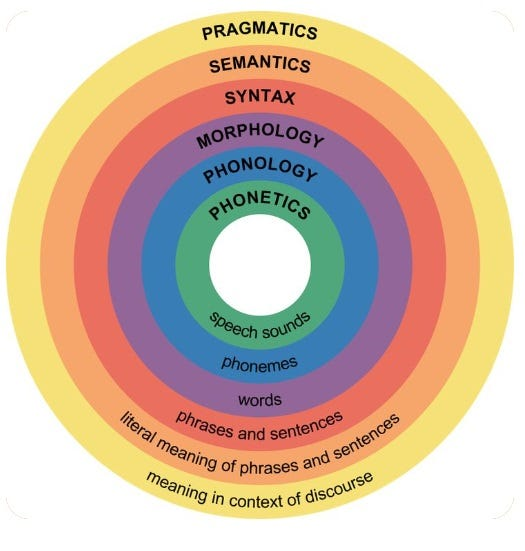Linguistics
Linguistics is the study of language, encompassing its structure, development, and use, whereas language is the tool used for communication.
Linguistics is generally considered a Social Science. It is the scientific study of language, and its study of language and its impact on human behavior, social interaction, and cultural contexts places it firmly within the realm of social sciences.
While linguistics also has ties to the humanities and even some physical sciences, its core focus on human language as a social and communicative phenomenon aligns it with disciplines like sociology, anthropology, and psychology, which are all considered social sciences.
Why Linguistics is Considered a Social Science:
- **Focus on Human Behavior: Linguistics examines how humans use language, how it shapes their thoughts and interactions, and how it varies across different social groups and cultures. This focus on human behavior and social dynamics is a hallmark of the social sciences.
- **Interdisciplinary Nature: Linguistics is interdisciplinary, meaning it draws from and contributes to other social sciences like anthropology, sociology, and psychology.
- **Scientific Approach: Linguistics employs scientific methods, such as observation, data collection, and analysis, to study language.
- **Social Context: Many areas of linguistics, like sociolinguistics, explicitly examine the social dimensions of language, including how language varies based on social class, gender, ethnicity, and other factors.
- **Study of Language Variation: Linguists study how languages change over time and how they vary across different social groups and geographic locations. This focus on variation and change is a key aspect of the social sciences.

- Phonetics: The study of speech sounds — how sounds are produced and perceived.
- Phonology: The patterns of sounds in a language — how sounds are organised.
- Morphology: The study of word structure — how words are formed from smaller units.
- Syntax: The study of sentence structure — how words combine to form sentences.
- Semantics: The study of meaning — how words and sentences convey meaning.
- Pragmatics: The study of language in context — how meaning changes depending on the situation.
In Judaism, Christianity, and Islam, language is often seen as a divine gift. Genesis in the Bible, for example, depicts God speaking to Adam and Eve, and Adam naming the animals, suggesting an innate ability to communicate. Some interpretations of the Tower of Babel story in Genesis also highlight the significance of language as a gift that was later fragmented. Similar views can be found in other religions. In Hinduism, Sanskrit is considered a sacred language, potentially revealed by the gods. Some Islamic texts also suggest that Allah gave humans the ability to speak and understand different languages as a blessing
- Evolutionary Biology: Evolutionary biologists argue that language is a product of natural selection, developing gradually over time as humans evolved. They point to the complexity of human language, with its grammar, syntax, and capacity for abstract thought, as evidence of this evolutionary process.
- Cognitive Science: Cognitive scientists explore the cognitive mechanisms underlying language acquisition and processing. They suggest that humans are born with a predisposition for language, but that language learning is also influenced by environmental factors.
Linguistic agnosticism refers to the idea that it is not possible to know for certain whether or not a particular language or system of communication is “better” or “more correct” than another. This concept is based on the belief that all languages and systems of communication are equally valid and have their own unique strengths and limitations.
Linguistic agnosticism can be contrasted with linguistic absolutism, which is the belief that some languages or systems of communication are inherently superior to others. This perspective can lead to language elitism, the idea that certain languages or dialects are more prestigious or desirable than others.
Linguistic agnosticism is often associated with linguistic relativity, the idea that the structure of a particular language can shape and influence a speaker’s thoughts and perceptions. This theory suggests that different languages may have different ways of organizing and expressing ideas, which can lead to differences in the way that speakers of those languages view the world.
― #genAI/chatgpt
Linguistic determinism is the concept that language and its structures influence and limit human knowledge or thought, as well as thought processes such as categorization, memory, and perception. The term implies that people’s native languages will affect their thought process and therefore people will have different thought processes based on their mother tongues.
Linguistic determinism is the strong form of linguistic relativity (popularly known as the Sapir–Whorf hypothesis), which argues that individuals experience the world based on the structure of the language they habitually use.
Linguistic Theology
Linguistic theology is the study of the relationship between language and religious thought and practice. It can include the examination of sacred texts, rituals, preaching, doctrinal statements, and private expressions of belief.
Some key ideas in linguistic theology include:
-
Theological language
The intellectual interpretation and conceptual reflection of religious language. It is concerned with the truth of religious texts and language.
-
Religious language
The language of religion itself, such as in religious texts, liturgy, and statements of religious awareness.
-
The meaning of words
The meaning of words when applied to God and to creatures. If the words have the same meaning, God’s transcendence is eliminated. If the words have different meanings, God’s immanence is obscured.
-
The role of language
Language is incapable of perfect communication because it is filtered through the sender and interpreted by the receiver. All communication requires interpretation